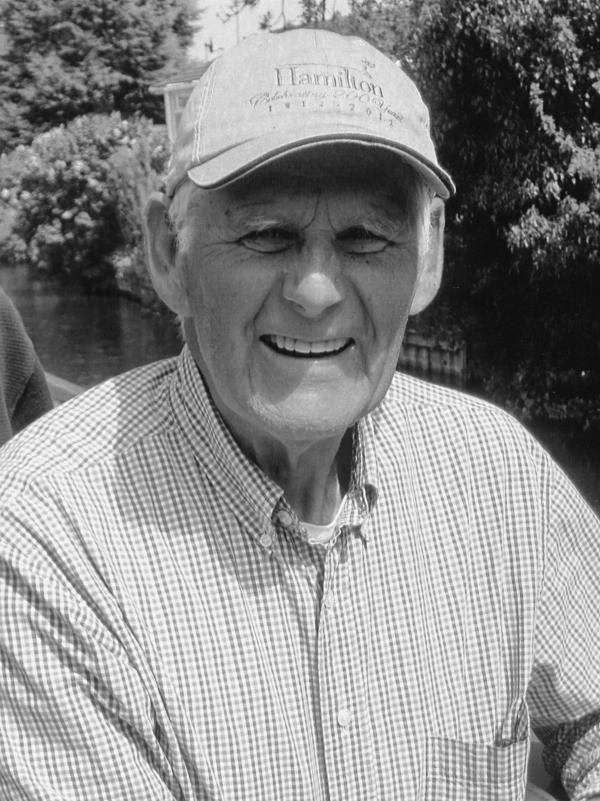Necrology
Because Hamilton Remembers


Edwin “Ted” Sidney Mullett '52
Jan. 29, 1930-Feb. 20, 2024
Edwin “Ted” Sidney Mullett ’52 died on Feb. 20, 2024, in Vero Beach, Fla. Born to Canadian immigrant parents in Williamsport, Pa., on Jan. 29, 1930, Ted graduated from Williamsport High School in 1947, and, at his parents’ urging, studied for an additional year at Ridley College, a Canadian prep school in St. Catharines, Ontario. While it was his parents’ hope that he would attend college in Canada, he would have none of it. Hamilton, one of three American liberal arts colleges to which he applied, was his choice.
On the Hill, Ted joined Alpha Delta Phi fraternity and was its president in his senior year. He majored in history. While baseball was of great interest when he was growing up in Williamsport — he played on a team that was a part of the then newly created Little League and was named a batting champion in 1942 — by the time he arrived at Hamilton, basketball, tennis, and football were his sports. He played all four years on the varsity basketball team and was elected captain for his junior year while also receiving the James H. Campbell Basketball Award in recognition of his level of play. He was in the Block “H” Club from his sophomore through senior years.
Joining the Intramural Committee during his second year, Ted was a member of Was Los, class president, and treasurer of the Student Council as a junior. That same year, he was awarded the McKinney Prize in Oratory. In his senior year, as president of his fraternity, he was on the Interfraternity Council.
Graduating in 1952 during the Korean War, Ted was admitted to the U.S. Navy’s Officer Candidate School in October. After his commissioning, he served for two years as a gunnery officer on the U.S.S. Rowe, a Fletcher Class destroyer which, during his time aboard, made a cruise to Europe, undertook anti-submarine warfare exercises in the Caribbean, and spent much time in the Sea of Japan off the Korean coast. After the Rowe returned to her homeport of Norfolk, Va., in October 1954, Ted was reassigned to the Naval History Division in Washington, D.C.
In a roundabout way, it was as a result of his Naval experience that Ted found his vocation. As he reported in his 50th reunion yearbook: “at sea, [I] couldn’t spend money, so I bought a few shares of stock. Eureka! They went up, and a new career beckoned.” Honorably discharged as a lieutenant junior grade on March 3, 1956, Ted returned to Williamsport and took a job with Merrill, Lynch, Pierce, Fenner & Smith. While he was training at the firm’s New York headquarters, he learned a new office was opening in Toledo, Ohio, and persuaded his superiors to assign him there.
While business was good in Toledo, in 1958, Bob Ackerman ’50, a fellow Alpha Delt, persuaded Ted to relocate to Fort Lauderdale, Fla., where the firm Goodbody & Co. was establishing a new office. Ted continued to prosper in Florida, and, of at least equal importance, he met Carol Watt, a high school teacher. They were married on June 11, 1960, in Fort Lauderdale. They had three daughters and a son.
Goodbody transferred Ted to Pompano Beach, Fla., and, later, to its headquarters in New York City, where he became a partner in the firm. He and his family moved from Florida to Summit, N.J., their home for the balance of his career.
In 1971, Goodbody collapsed when it, along with several other Wall Street firms, was unable to handle the recordkeeping attendant to a surge in trading volume that began in the late 1960s. In 1969, Goodbody reported a loss of $7.5 million stemming from a computer problem, and it never recovered. In his 50th reunion yearbook entry, Ted succinctly described the personal financial consequences of the firm’s failure: “wipeout.”
Fortunately, Ted’s reputation as a stockbroker transcended his affiliation with Goodbody, and very quickly he was hired by Dean Witter Reynolds, at the time among the largest member firms of the New York Stock Exchange, first as a replacement manager and then, a few months later, as manager of its Milburn, N.J., office. He remained there until his retirement in 1991, rebuilding his finances, sending three of his children to college, and seeing two of his daughters married.
Ted immersed himself in Summit’s community life. He was, at different times, a deacon and an elder of the Central Presbyterian Church. An active tennis player, he joined the Summit Tennis Club and held a variety of offices there, including club president. Dedicated to the Rotary Club, he served as president of the Summit chapter.
On retiring, Ted returned to Florida with Carol, their destination being Sea Oaks, a tennis village outside Vero Beach. Several months later, while on a driving tour of the Blue Ridge Mountains of Southwestern North Carolina, they stopped at the small community of Lake Toxaway, which lies close to the state’s border with Georgia. Though Ted was initially uncertain, Carol was not: this was where she wanted to live during the summer months. Florida was for winters.
Again, Ted found his place in the community: as a member of the small Methodist Church, as an officer in the property owners association, as a substitute teacher in the public schools, and, for a time, on the board of the local power company. As in Summit, both here and in Vero Beach, he was active in the Rotary Club. He brought his professional expertise to bear on behalf of small investors engaged in proxy fights, and was the subject of an article in Barron’s, in which he was characterized as David taking on the Goliaths of large corporations.
He and Carol also traveled widely, by renting motorhomes in the U.S., New Zealand, and Europe, chartering self-operated canal boats in the U.K., Ireland, and France, and even spending time on farms in both the U.K. and China. The same drive that led to his becoming a substitute teacher guided him to seize short-term opportunities to teach English as a second language in a dozen different countries.
During the course of their travels, Ted and Carol took the opportunity to scuba dive, go whitewater rafting, and hike wherever and whenever possible. In addition to tennis, Ted’s other racket sports included paddle tennis and pickleball, both of which he picked up around 2013, when he was in his early 80s.
Ted’s memories of Hamilton, by his account, fall into two categories: the pleasant and the agonizing. The pleasant included the meals at his fraternity, thanks to its cook Frau and custodian Walt Schmidt, the luxury of life at Carnegie dormitory, no doubt in part due to its working fireplaces, and life with his roommate, Jim Robinson ’52. Agonizing? Being captain of a basketball team that, during his tenure, never won a game.
Ted supported the Hamilton Fund and the Bicentennial Initiatives campaign.
Edwin “Ted” S. Mullett was predeceased by one daughter and is survived by his wife, two daughters, a son, and seven grandchildren.
Note: Memorial biographies published prior to 2004 will not appear on this list.
Necrology Writer and Contact:
Christopher Wilkinson '68
Email: Chris.Wilkinson@mail.wvu.edu

The Joel Bristol Associates
Hamilton has a long-standing history of benefiting from estate and life payment gifts. Thoughtful alumni, parents, and friends who remember Hamilton in their estate plans, including retirement plan beneficiary designations, or complete planned gifts are recognized and honored as Joel Bristol Associates.
Contact
Office / Department Name
Alumni & Parent Relations
Contact Name
Jacke Jones
Director, Alumni & Parent Relations
